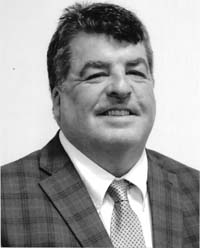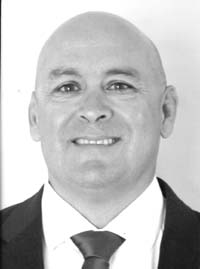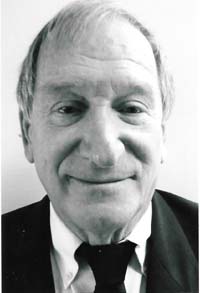 |
|||
 |
 |
 |
|
Tim Buck Grandville |
Cliff Perez Ludington |
Chuck Reed Whittemore-Prescott |
|
(click on Inductee's name to read 'description')
 |
|||
 |
 |
 |
|
Tim Buck Grandville |
Cliff Perez Ludington |
Chuck Reed Whittemore-Prescott |
|
(click on Inductee's name to read 'description')

 Tim Buck, Grandville High School
Tim Buck, Grandville High SchoolWhen you look at the Grandville High School tennis program from the perspective of, say, the last half century, it seems as if there was always a member of the Buck family involved. Tim played for his alma mater. Prior to that, so did his brother. His sister and niece competed for the Bulldogs. So did Tim’s son and two daughters. When Tim coached the team – which included a niece - his father, the mayor of Grandville, helped out as an assistant.
“Tennis roots run deep in our family,” says Tim. He took up the game because The Mayor had been an accomplished tournament player who competed at the varsity level at Hillsdale College. Tim was also incentivized by the tennis boom of the 1970s.
It was no surprise that he played four years of varsity tennis for Grandville High School, the team qualifying for state competition twice and finishing fifth his senior year. “Tim had so much talent as a player and we developed a bond of respect because we both knew it would help him,” says Tiger Teusink, who at the time was coaching at Holland High School. “He got many warnings and point-penalties, but always thanked me for running a good tournament.”
Tim went on to an equally impressive playing career at Ferris State University where he achieved championship status both in singles and doubles in the Great Lakes Intercollegiate Athletic Conference. After college, he worked at the Homestead Resort in Glen Arbor, Michigan doing several jobs, one of which was serving as a teaching pro. But then he moved back home to Grandville in 1987, taking a position as a social worker working with chronically mentally ill adults. “There was some flexibility in my job as far as timing, so I jumped on the open tennis position at Grandville,” he says. He also coached hockey at Grand Rapids Creston, having played youth travel hockey through the ninth grade. “Hockey has always played a big part of my life,” he says. “My dad got my brother and me involved early on in Muskegon.”
Over the years, both Tim and Mayor Jim enjoyed watching Tim’s three children play successfully for the Bulldogs. All three were conference and regional champions in their respective flights. “We have also experienced the beauty of coaching my niece and his (Jim’s) grandchild, who graduated in 2001,” he says. As it turns out, the niece has co-directed the Grandville summer program for the past decade. Indeed, Grandville tennis is a family affair. Tim’s daughter and oldest son have been assistant coaches.
The concept of family extends to competition in the very powerful OK Red conference. Over the years, Tim has enjoyed the friendship of excellent coaches which include such prominent programs as Rockford, Grand Haven, West Ottawa, East Kentwood, and Hudsonville. He counts East Grand Rapids’ Charlie Partin, Holland’s Tiger Teusink, Jenison’s Tom Leyrer, and West Ottawa’s Karen Page as good friends. Tim calls the conference “a very competitive brotherhood.”
“Tim is one of those coaches who made it fun to compete in the OK-Red Conference,” says Tom, a former MHSTeCA president and 1996 Hall of Famer. “An example of this would be our Cats & Dogs (Wildcats vs. Bulldogs) Tournament. Two rival high schools working together to host an Invitational. He had his parents grilling hot dogs for all of the players, parents and coaches. He was always with us when we would meet for pizza after the conference draw in Holland,. We would all work for our teams at the draw but then it was all fun at Fricano’a Pizza. I’ve always enjoyed his quick sense of humor and appreciated his high degree of sportsmanship.”
“The entire Buck family made the competition among our schools a great experience,” confirms Tiger. “Tennis in the OK Red was fun because the coaches got along so well.”
To win in this very competitive conference featuring some of the best teams in the state had to be special. Indeed, Tim’s squads captured three boys championships and three regional titles.
But more to the point, Tim rubbed shoulders and gained the respect of an august group that included Tom, Tiger, Karen, and Dave Berles of East Kentwood. What do they all have in common? They are all in the Hall of Fame.
Add one more.
| Back to Top |
 Cliff Perez, Ludington High School
Cliff Perez, Ludington High SchoolYou have to admire Tom Kudwa in terms of his persistence. The Ludington Hall of Famer (Class of 2005) spent an inordinate amount of time trying to talk young colleague Cliff Perez into becoming his JV tennis coach despite the fact that Cliff had never held a racket. “He was not born with a silver tennis racket in his hand,” quips Tom. “He had never played the sport and had no interest in it. But I was not after his tennis prowess as he had none. I was after his personality and his work ethic that I had witnessed in other arenas.”
One arena was wrestling. In his youth, Cliff was a two-time state qualifier at Adrian High School who went on to compete for MSU. After graduation, he took a commission as a Second Lieutenant in the U.S. Marine Corps and served in Desert Storm. Upon leaving the military, he taught middle school science and coached volleyball, track and basketball in Texas before returning to Michigan. He came to Ludington as a middle school PE and Health teacher and wrestling coach.
That’s where and when Tom latched onto him. Cliff finally caved (Tom’s word) to tennis, primarily because he knew he was to be mentored by a superb leader who was also a Coach of the Year. Together they faithfully attended the Troy workshops. Cliff read books, took lessons, and became the co-director of the summer program. He spent 6 years coaching at the junior high level and 21 years as the JV guy. In other words, he worked his way up.
In discussing the beginnings, Tom states: “If success was measured in what the girls learned about tennis or by how much winning took place in those early years, then my choice was a miserable failure. If success was measured in the energy and positive atmosphere that Cliff created on and around the court, then I had picked a winner. It was only a matter of time. The girls loved Cliff and began to love tennis. They were eager to get on the courts, to go to camps, and to take lessons. Cliff created a culture at the JV level and the numbers began to rise. The girls loved playing and got other girls to join the program. Cliff learned the game alongside them. “
He learned to the point where when Cliff took over the varsity boys position, Tom became his assistant. In those 18 seasons, the two developed teams which won eight conference titles, were runners-up seven times, and came in third on three occasions. In other words, they were never out of the top three in the league.
Moreover, his last few seasons were some of his best. Cliff’s teams finished in the top ten of the state four times, the best being in 2012 when they ended in third place. That was the year he was voted Coach of the Year by our board. “Not bad for a rural tennis team with no ‘club players’ and no tennis pro in the area,” says Tom. “Tennis had come alive in the Ludington area for both boys and girls and Cliff was a huge factor.”
Although Cliff was a neophyte to the game while Tom was the well-known factor in the area, they gradually became equals. “As the years went by, the dynamics of our relationship grew,” says Tom. “We became co-coaches. We became equals.”
Cliff didn’t inherit players; he developed them. He began a Western Michigan Co-Ed Middle School Program through the Ludington Recreation Department. Middle school kids could play after school in the spring, then continue to practice two days a week at 6:00 p.m. On Saturdays, the participating schools could play duals. Cliff would coach them whenever his JV team did not have a tournament. In other words, he got parents involved when he couldn’t be two places at once, a precursor to player-parent involvement when those kids got to high school.
What Cliff did for the Ludington tennis was nothing short of wonderful,” summarizes Tom. “His energy and enthusiasm was contagious. His work ethic and determination paid huge dividends. Moreover, he became a great coach technically. He picked up the game late in life, learned how to play it, and learned how to coach it. He currently gives lessons at the Riverside Racquet Club in Vero Beach FL but returns to Ludington in the summer as director of operations of the Epworth Heights Tennis Center.”
In summary, Cliff’s decision to take up tennis coaching led to a 20 year career of coaching middle school tennis programs, Girls JV tennis, Boys Varsity Tennis, and summer tennis camps. He was a USTA tournament director, a Boys Regional Tennis director and eventually became so respected that he worked with Gina Mazzolini and Gary Ellis on the MHSAA Boys State Tennis seeding committee.
Batman entered the Hall of Fame in 2005. Now it’s Robin’s turn.
| Back to Top |
 Chuck Reed, Whittemore-Prescott High School
Chuck Reed, Whittemore-Prescott High SchoolIn July of 1977, a group of tennis coaches from around the state gathered at Bill Oliver’s Lodge on the shores of Houghton Lake near Prudenville to establish the Michigan High School Tennis Coaches Association. They were there at the invitation of Founder Bob Wood who saw the need to organize our sport. After all, before that time, there were no tennis coaches of the year or all state teams. There was no united voice to communicate with Warren McKenzie and the MHSAA in terms of rules changes and regional assignments. There was no Hall of Fame.
Among those Founding Fathers was Whittemore-Prescott’s Chuck Reed, on the surface a curious selection given the relative obscurity of his school in terms of high school tennis history. But make no mistake, Chuck was not an obscurity as a high school and college player. Competing for Hall of Famer Ed Burrows (Class of 1995) at East Jordan, he was a semi-finalist in doubles his sophomore year and was regional champion at 1S the next two, reaching the semi-finals at the state level both times.
“He made the trips to Kalamazoo unforgettable,” says Chuck of Burrows. “Furthermore, if you had split sets, by the time Coach Burrows had finished talking, you absolutely knew that you were going to win the third set.” More to the point, while playing in then-Class C-D, Chuck met Bob Wood who was in the early years of his coaching career at University Liggett.
Chuck went on to letter all four years at Central Michigan on scholarship. He roomed with teammate Jerry Kennedy and won the conference championship at 5S. “As a player, he was very steady and usually outlasted most opponents,” says Jerry who shared runner-up honors in doubles with Chuck their final two seasons. “He was definitely the leader of the team,” adds John Shade who was a freshman when Chuck was a senior. “He was liked, respected, and a great competitor.”
Chuck was hired literally off the CMU tennis courts by Superintendent Ray Kesler after a match against Wayne State. Whitemore-Prescott was building a new shop facility and Chuck was an industrial arts teacher. He also coached football, basketball, and, of course, tennis at the school.
It didn’t take him long to reappear at the state high school tournament, this time as a coach. Chuck Nichols, his singles player under the old format, accumulated enough points to place the “team” in the top ten of Class C-D. Others qualified as well which brought Chuck back to Kalamazoo. More to the point, that’s where and why Chuck renewed his relationship with Bob Wood resulting in an invitation to that first historic meeting.
“I was competing at the state tournaments against his teams,” says Battle Creek Springfield’s Jim Cummins. “He was a class act. If my memory serves me correctly, he was quite reserved at those first meetings but had good ideas when he opened up.”
These board meetings became an annual event at Houghton Lake. While others played golf and tennis in between sessions during those weekends. Chuck brought his boat and together with Ken Gutow’s help, got young Kim Wood up on skis for the first time. He also brought Kevin, his six-year old son.
Chuck continued to coach so successfully that he was named Class C-D Coach of the Year in 1980. “As a coach he always valued the importance of fair play and respect for team members and opponents and that was one big reason he was able to maintain solid, talented, and well-mannered teams over the years,” says Jerry who would bring his Tri County team to Chuck’s tournament. “Chuck put my team up in his camper and his house; we slept all over, but what a great experience. His team was usually qualifying for state and always had a strong line-up. Chuck built positive people and the overflow from that were successful seasons.”
In the midst of those years, son Kevin “got the tennis bug” (Jerry’s words) and emerged as one of the best players in the state. Kevin lost to Detroit County Day’s David Russell twice in the final championship match before winning it his senior year.
“My dad encouraged sports in general and I was the beneficiary of his basketball coaching as well, he says. “I was a gym rat who would play and practice from the time I could walk during his practices. It wasn’t a given that I played tennis because my dad never forced me to any particular sport. His philosophy was always that he wanted to give his kids the opportunity to be successful in something / anything. He was more of an encourager and seeded my mind with the positive aspects and experiences that sports provide.”
Kevin played two of his final tournaments at Stowe Stadium which means that Chuck came even more full circle – first as a player there, then as a coach, then as a father. “I think I was always aware of how lucky I was to be able to spend time with my dad through sports,” he says. “He always encouraged sportsmanship and humility. Let your game do the talking. The internal satisfaction of outplaying your opponent/winning, was my ‘bug’.”
It is simply amazing that Chuck achieved this kind of success given the lack of facilities – three courts at Whittemore, two at Prescott, and one in Chuck’s backyard --in one of the most economically depressed school systems in the state. “When you are trying to compete to get through a regional with schools that have access to tennis clubs and families with high disposable incomes, it was a virtual miracle to make individual or team appearances in the state tourney,” says Kevin. Tennis practices were often in the gym during early spring days and once or twice, the team would journey to the Midland Community Tennis Center to experience a couple of days on a “legit” tennis court. The result: another State Coach of the Year honor for Chuck in 1994.
“Nothing says more about my dad than the number of former players and students who came back to visit our home over the years (and sometimes sneak out back to hit a few balls) because they think of him as a friend,” concludes Kevin. The man deserves so much credit for what he has done as a pioneer, Founding Father and coach.
His induction into our Hall of Fame is long overdue.
| Back to Top |